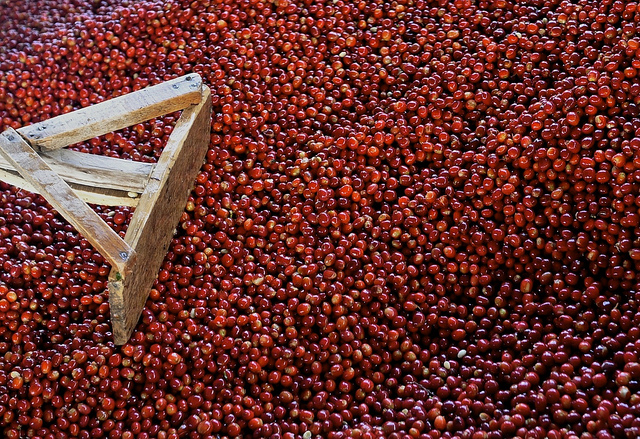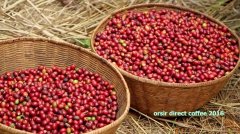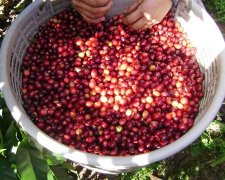Water washing Red Cherry Project-Yega Ficher Kochere Biloya Cooperative Biloya Coop

For professional baristas, please follow the coffee workshop (Wechat official account cafe_style)
Introduction of the Red Cherry Project
In 2007, Trabocca Dutch traders launched the Red Cherry Project. In order to encourage coffee farmers to produce the best quality coffee, whether in water washing, semi-washing, sun drying, and half-sun treatment, farmers who work hard to produce high-quality coffee beans can receive substantial comparative rewards and rewards.
Before the production season, Trabocca will invite selected farmers or producers to participate in the project to produce micro-batches of coffee (about 1500 to 3000 kg), carefully pick 100% ripe red coffee cherries by hand (hence the name Red Cherry Project) Trabocca to provide financial loan support, "new hardware" and "production technology" and "processing knowledge and technology" to assist farmers. And promise to buy it at a good price as long as the quality of the actual output meets the cup test standards in the Amsterdam Cup test rooms of Ethiopia and the Netherlands.
The passing standard set by the Trabocca is 88.
The coffee beans of the red cherry project are packed in plastic inner bags or vacuum boxes immediately after the processing of the origin is completed, and then shipped to Djibouti for shipping.
Strive for perfect quality through immediate monitoring, safe transportation and timely and appropriate handling.
And because of this red cherry project, roasters can buy high-quality coffee beans, which can also improve the quality of Ethiopian coffee and have a better price!
Trabocca can also give profits back to farmers, and can continue to improve, the quality continues to improve.
Note: the ripe coffee fruit looks like a cherry, so it is called "coffee cherry".
Introduction of Biloya Cooperative (Biloya Coop)
The Biloya Cooperative (Biloya Coop), located in the town of Cochel, south of Kochere, was founded in 1976 and joined the YCFCU Cooperative Union in 2002.
It is composed of 2080 family members of small coffee farmers. the average cultivated area of these small coffee farmers is less than 4 hectares at an altitude of about 1600-2500m. The coffee varieties are mainly a mixture of Typica and Heirloom (native species). Every one or two years, members of the cooperative will vote in an election to elect an executive committee, and the executive committee can decide on the purchase of new equipment, exchange business information with members, and how to pay for transactions.
In addition, YCFCU will also assign professional managers to cooperatives to provide guidance and advice on harvest, production and other procedures, so as to increase production and improve quality. The establishment of the cooperative, so that its farmers can avoid the low-price exploitation of acquirers!
In times of economic hardship, co-operatives can also provide loan assistance, which is very positive for both farmers and coffee production. Biloya cooperatives build schools and small-scale power generation, build bridges and roads, and make a great contribution to the local construction of the village.
Baking
Shallow baking
Flavor
Lime, grapefruit, lavender, melon, sweet and bright!
The flavor of citrus and melon and fruit echoes the fragrance of lavender flowers, meticulous and succulent, smooth and sweet!
Authentication
Red Cherry Project (Operation Cherry Red)
Carefully hand-picked 100% ripe red coffee cherries (hence the name Red Cherry Project)
The country
Ethiopia (Ethiopia)
Producing area
The town of Kochere, Yirgacheffe
Producer
Biloya Cooperative (Biloya Coop)
Variety
Ethiopian native species (Heirloom)
Childbearing season
November every year to March of the following year
Treatment method
Washing treatment method
Altitude
1700 m ~ 2200 m
Date of manufacture
After receiving the order, check the account and bake
Important Notice :
前街咖啡 FrontStreet Coffee has moved to new addredd:
FrontStreet Coffee Address: 315,Donghua East Road,GuangZhou
Tel:020 38364473
- Prev

Dintu of Dingtu Village, the Sidamo producing area of West Dharma, the most famous coffee producing area in Ethiopia.
For the exchange of professional baristas, please follow the exclamation point in the coffee workshop (Wechat official account cafe_style) Sidamo producing area (Sidama) coffee mother land, the original coffee forest! Ethiopia's rich native species, genetic diversity, cultivate almost all the coffee in the world. Three well-known producing areas: Sidamo, Yirgacheffe, HARRAR Coffee
- Next

History of planting and treatment of Wamuguma in Thika Wamgumar treatment Plant, Sika District, Kenya
For the exchange of professional baristas, please follow the coffee workshop (Wechat official account cafe_style) the history of planting and processing of Kenyan coffee. The history of Kenyan coffee can be traced back to the end of the 19th world. Coffee tree species were introduced from neighboring Ethiopia in the north. After improvement of their own varieties, there are four common varieties: Bourbon and Kents.
Related
- Detailed explanation of Jadeite planting Land in Panamanian Jadeite Manor introduction to the grading system of Jadeite competitive bidding, Red bid, Green bid and Rose Summer
- Story of Coffee planting in Brenka region of Costa Rica Stonehenge Manor anaerobic heavy honey treatment of flavor mouth
- What's on the barrel of Blue Mountain Coffee beans?
- Can American coffee also pull flowers? How to use hot American style to pull out a good-looking pattern?
- Can you make a cold extract with coffee beans? What is the right proportion for cold-extracted coffee formula?
- Indonesian PWN Gold Mandrine Coffee Origin Features Flavor How to Chong? Mandolin coffee is American.
- A brief introduction to the flavor characteristics of Brazilian yellow bourbon coffee beans
- What is the effect of different water quality on the flavor of cold-extracted coffee? What kind of water is best for brewing coffee?
- Why do you think of Rose Summer whenever you mention Panamanian coffee?
- Introduction to the characteristics of authentic blue mountain coffee bean producing areas? What is the CIB Coffee Authority in Jamaica?

